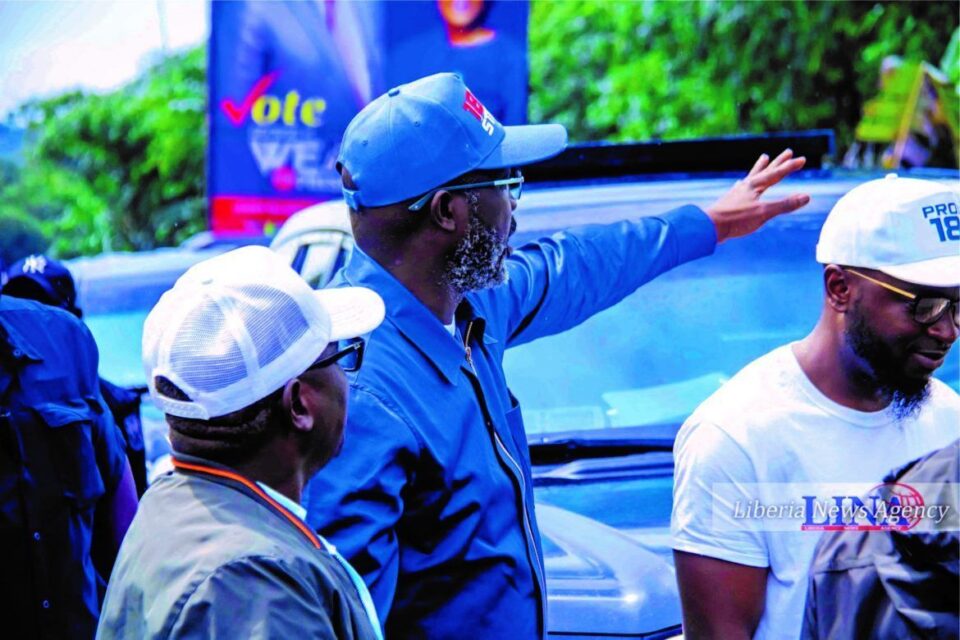Says Nonenforcement Of Campaign Finance Regulation “Failed To Ensure Transparency And A Level Playing Field”
FLASHBACK: Pres. Weah on his Oct. 10 election campaign trail
By Our Staff Writer
Huge amount of Liberian taxpayers’ money was pumped into the October 10, 2023 elections campaign of incumbent President George Manneh Weah and his ruling CDC party, it has been revealed in Monrovia.
Although the European Union (EU) election observation mission (EU EOM) has given thumbs up to the peaceful and orderly conduct of last Tuesday’s presidential and legislative elections, it has raised serious concern over violation of campaign finance regulations which undermined level playing field.
The European Union Election Observation iMission is led by Chief Observer, Andreas Schieder, a Member of the European Parliament from Austria. In total, the mission will comprise around 100 observers from 27
EU Member, States Canada and Norway.


Chief Observer, Andreas Schieder
President Weah has been facing 19 other presidential candidates in a hotly contested race.
“Abundant use of state resources by the incumbency distorted the level playing field,” says the preliminary report of the EU-ECOM dated October 12, 2023.
President Weah, the former international football icon-turned politician, has so far not reacted to the report by the EU election observers.
Article 5. of Liberia’s Campaign Finance Regulations of May 6, 2016 on “Accounting for Contributions” says: “Every contribution received by or on behalf of a political party or a candidate for a campaign shall be recorded and reported to the NEC by the campaign treasurer.
However, according to the EU election observers’ report, “the disproportionate spending on behalf of the ruling party and incumbent president distorted the fairness of the campaign.”
The EU-ECOM noted that the National Elections Commission (NEC) lacks the capacity and resources “to effectively fulfil its oversight and sanctioning functions”.
Article 20and 20.1. on the Campaign Finance Offences say:
“20.1. Any violation of the provisions of these Regulations, and any violation of the expense limitations provided for by Law, that involves the making, receiving or reporting of contributions or expenses totaling US$5,OOO.OO (or its equivalent in Liberian Dollars) or more, and which the NEC finds was committed knowingly and willfully, shall be considered an “Election Offense,” shall be subject to the penalties specified in sections 2.9(x) and 10.7 of the Elections Law, or the criminal penalties provided for by Law for “Election Offenses.”
According to the EU observers, “Campaign finance regulations are overall in line with international standards, but their lack of enforcement failed to ensure transparency and a level playing field.”
Weah and his CDC are said to have massively used Liberian government’s money and logistics to run their elections campaign across this West African state.
“The disproportionate spending on behalf of the ruling party and incumbent president distorted the fairness of the campaign. EU observation showed an obvious disparity in terms of resources available to CDC for the presidential campaign in all 15 counties in terms of billboards, posters, vehicles, t-shirts etc. The widespread use of state resources in the form of official vehicles and buildings was widely observed by EU EOM observers,” says EU-ECOM.
The report further says:
“Many appointed officials at county or electoral district level were publicly campaigning in favour of the ruling party. In some counties EU EOM observers reported that civil servants were pressured to attend ruling party’s campaign events.”
In Liberia, there is no law for the use of government money to fund political parties.
Before the October 10, 2023 elections, some political observers had raised concerns about Weah and his officials using government money and resources to fund their second term bid. Concerns have also been raised about the increasing use of money by politicians to influence voters in the country’s elections.
“Direct EU EOM observation and information from stakeholders showed a high level of monetisation and bartering during the electoral campaign,” says the report by EU election observation mission to Liberia.
Some candidates are said to have “openly admitted” to EU observers that they distributed money or goods throughout the October 10 electoral process “and saw it as part of their campaign spending”.

